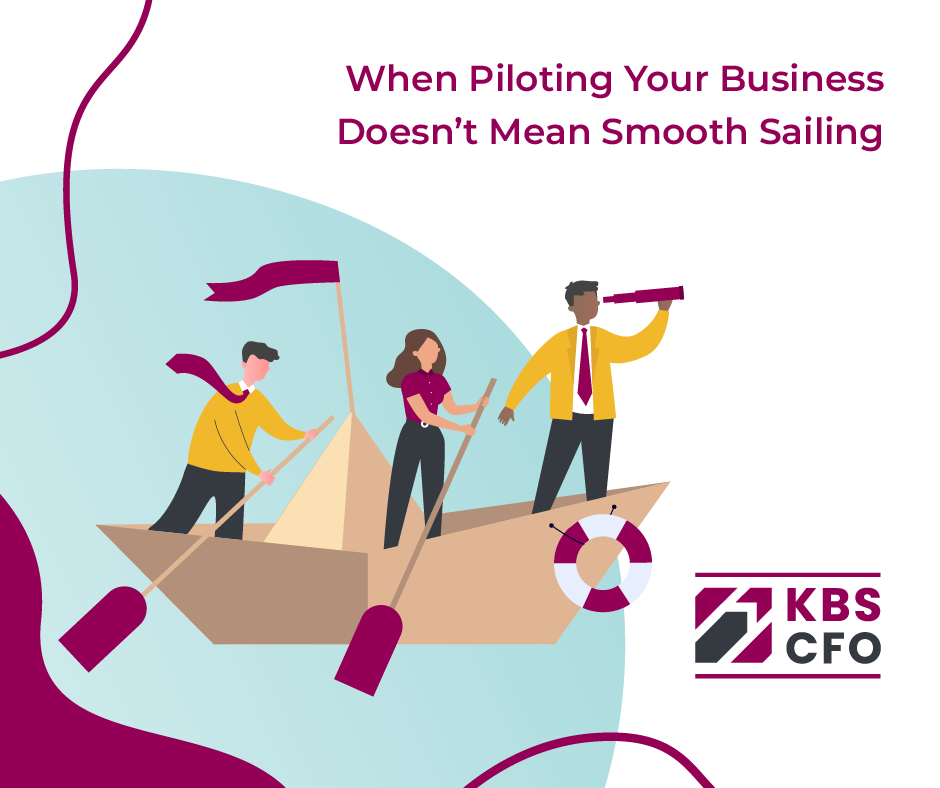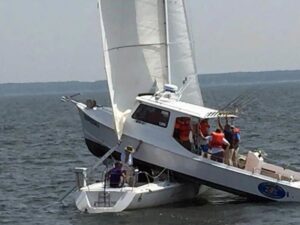Blog

When Piloting Your Business Doesn’t Mean Smooth Sailing
Recently I’ve been taking sailing lessons on the nearby Chesapeake Bay. It’s been a fun and relaxing pastime during a particularly stressful year. My sailing instructor has been teaching me watercraft safety rules and sharing some cautionary tales. What has been striking to me is how many of those rules also apply to landlubbers—and business owners.
One incident in particular was on my mind. In June 2020 a powerboat struck a sailboat, as you can see here. Yes, that picture is real. Miraculously nobody was hurt.
But, naturally there was a lot of speculation in the boating community about how such a bizarre accident had occurred. Two boating experts even did a video reenactment (without the crash) using similar boats in an attempt to discover why neither boat had swerved to avoid the other on a clear and sunny day.
Based on the reenactment and statements by people involved in the accident, the experts concluded that the captain of the powerboat simply did not see the sailboat. The captain of the sailboat saw the powerboat but knew that he had the “right of way” and the other boat needed to change course. By the time he realized he needed to take action, it was too late.
How Boating Principles Help You Run A Business Better
One boating instructor who participated in the reenactment observed that the incident was a classic case of the powerboat captain’s failure to heed boating’s rule #5: Look out. It’s a rather simple rule, but a powerful one. It reminds people piloting watercraft to always be looking and listening and staying alert to their surroundings.
The captain of the sailboat also failed to practice “defensive driving.” He assumed that the other vessel would adhere to the “rules of the road” and give way. He didn’t take into account the possibility that the other captain was oblivious or negligent.
How do business owners end up in equivalent disasters? It can happen in a couple of different ways. Sailing and running a business are both about teamwork. Accountants are often siloed away from the rest of a business, but they need to be an integral part.
Your team cannot work effectively when the person who would notice the danger signs (otherwise known as your numbers) is isolated from the team members making decisions. Likewise, if the team is busy worrying about who has the “right of way” and the authority to act in a situation, you can miss an opportunity or go off course.
Never Put Business Matters on Autopilot
Business owners and boaters also share similar passions for what they do. But, it is easy to get caught up on your business’s day-to-day demands—particularly when things are going well. On a relatively calm day with smooth sailing, you can get lulled into a false sense of security, forgetting that you need to look around and remain aware of your environment.
However, like the captain of a boat, you can’t afford to relax your vigilance. You must always know what is going on in your field and the larger economy. Otherwise you might miss a major takeaway—perhaps something important an employee tells you about customer dissatisfaction or the glimmers of a seismic shift in your industry.
2020 has shown how vital such awareness is. When COVID struck, people who were quick to understand the implications of change were much better positioned to take action. Certainly the pandemic and the ensuing economic roller coaster have demonstrated that nobody can predict when or if you will have smooth sailing.
You can never put your business on autopilot. You need to be ready to tack, jibe, and steer your business vessel based on changing conditions.
In the distillery business, you might be asking yourself questions about staying on course. Should you shift gears in some way or focus on your primary product? Does there feel like there’s a hole in the boat? Perhaps the numbers aren’t adding up and you need some help making sense of them.
People often think of accountants as bookkeepers, the people who keep track of what comes in and goes out. But a good accountant should do a lot more than act as a historian of what your business already spent. They can help you be forward looking and “look out” for unforeseen obstacles that might be looming on the horizon. Perhaps you need someone like that on your team to ensure smooth sailing.
Has your business outgrown its current financial advisor? We serve clients in Montgomery County, Frederick County, Washington D.C., and around the country. Contact KBS CFO today and see what we can do for you!

